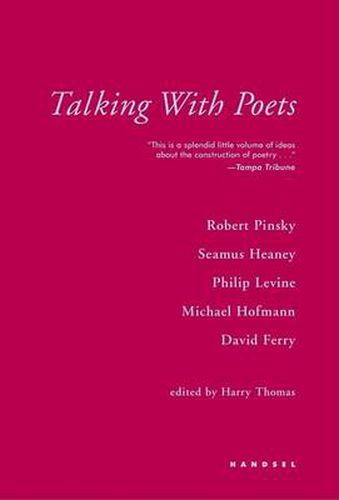Readings Newsletter
Become a Readings Member to make your shopping experience even easier.
Sign in or sign up for free!
You’re not far away from qualifying for FREE standard shipping within Australia
You’ve qualified for FREE standard shipping within Australia
The cart is loading…






The five interviews in this book were conducted by students in The Art of Poetry, a course that Harry Thomas taught for several years. The students’ depth of knowledge and keenness of insight into the poets’ work is an affirmation of American education. The poets respond to the students with a frankness and feeling of fraternity that mounts at times to a sort of communion. The poets take up a great range of matters in the interviews - the nature of artistic creation, the varieties and difficulties of poetic translation, poetry and politics, religion, popular culture, the contemporary readership for poetry, and the experience of living as a poet in a country not your own. They speak with familiarity and enthusiasm of a number of writers, including Eliat, Joyce, Rilke, Brodsky, Pound, Ovid, Dante, Ralegh, Wordsworth, Keats, Mandelstam, and Wilde. One of the delights of reading these interviews is to observe the poets responding to the same matter - for instance, Seamus Heaney speaking of Robert Pinsky’s translation of Czeslaw Milosz’s great poem, The World, and Robert Pinsky speaking at length of Seamus Heaney’s essay, in his book The Government of the Tongue, on Pinsky’s transla
$9.00 standard shipping within Australia
FREE standard shipping within Australia for orders over $100.00
Express & International shipping calculated at checkout
The five interviews in this book were conducted by students in The Art of Poetry, a course that Harry Thomas taught for several years. The students’ depth of knowledge and keenness of insight into the poets’ work is an affirmation of American education. The poets respond to the students with a frankness and feeling of fraternity that mounts at times to a sort of communion. The poets take up a great range of matters in the interviews - the nature of artistic creation, the varieties and difficulties of poetic translation, poetry and politics, religion, popular culture, the contemporary readership for poetry, and the experience of living as a poet in a country not your own. They speak with familiarity and enthusiasm of a number of writers, including Eliat, Joyce, Rilke, Brodsky, Pound, Ovid, Dante, Ralegh, Wordsworth, Keats, Mandelstam, and Wilde. One of the delights of reading these interviews is to observe the poets responding to the same matter - for instance, Seamus Heaney speaking of Robert Pinsky’s translation of Czeslaw Milosz’s great poem, The World, and Robert Pinsky speaking at length of Seamus Heaney’s essay, in his book The Government of the Tongue, on Pinsky’s transla